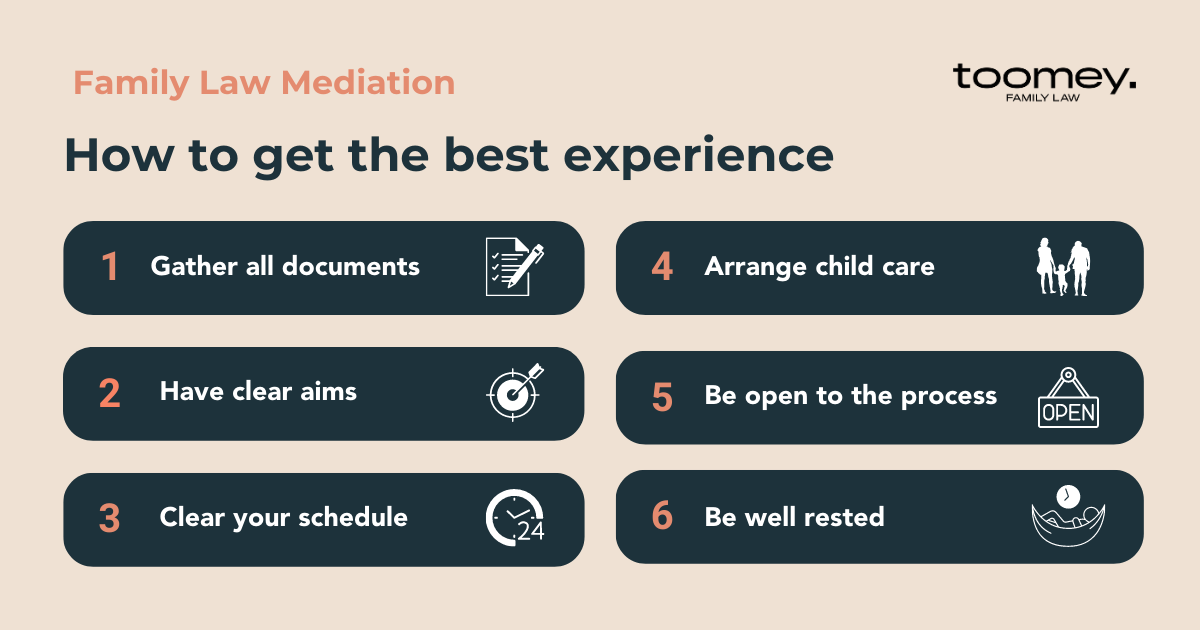
03 May How to get the best family law mediation experience
Mediation is a term you’ll have heard before. Whether you’ve experienced it yourself, had family or friends involved in one or just from watching the news – it’s something that many people are familiar with. But what does it mean in the family law context? And when it really matters, how can you make sure that you’re getting the best family law mediation experience?
How to get the best family law mediation experience
Let’s start at the beginning.
What is family law mediation?
In a family law context, mediation is a voluntary dispute resolution process where conflicting parties meet with an independent third person to reach agreement on financial or parenting issues. If the conflicting parties are open to resolving their disputed issues, mediation is an opportunity for resolution and agreement, outside the courtroom. When successful, mediation can save both parties considerable time, money and emotional resources.

What is the purpose of family law mediation?
The purpose of mediation in family law is to resolve parenting, child support, spousal maintenance and property matters. One of the main benefits is it can avoid extensive, protracted litigation and is quick and cost-effective.
Anything in dispute between the conflicted parties can be mediated, including financial and property issues, child support and parenting arrangements.
When should you turn to family law mediation?
Family law mediation can be used at any time during a separation, including before, during or after the separation or even once a court case has begun. In fact, in family law parenting and property matters, the Federal Circuit and Family Court of Australia (FCFCOA or the Family Court) requires mediation before an application can be filed (except under certain circumstances such as child abuse or family violence).
So for most practical purposes, if you’ve been unable to reach an agreement with your ex-partner and would like to, family law mediation is your next step.

What is the family law mediation process?
In the mediation process, conflicting parties meet with their solicitors and a qualified family law mediator. The mediation is usually held at a venue convenient to both parties. Each party has access to their own meeting room, so they can separately meet with their solicitor, and there is also a joint meeting room. Since COVID, ZOOM mediation have become very popular and user-friendly.
Shuttle mediation option
If you feel unable to meet in the same room as your ex-partner, mediation is still an option. In our experience, 99% of family law mediations are conducted by way of ‘shuttle mediation’. This is where conflicting parties each remain in separate rooms at the mediation venue. The mediator talks individually with each party, ‘shuttling’ between them to discuss options and help move disputed matters along. This can happen in person or on ZOOM, so there is no need to be confronted with your ex-partner or their legal team during mediation.
How to get the best experience for family law mediation
For a successful family law mediation, it’s important that you and your legal team come well-prepared for your family law mediation so that you can make the most of the process. Being well prepared includes:
- Collating all necessary documentation regarding the property pool, child support and parenting arrangements.
- Be very clear on what you would like resolved through mediation. Nothing should be a surprise. Know what you are prepared to agree on, and which areas on which you are prepared to reach a compromise. Don’t enter mediation determined not to budge on one unmoveable position.
- Clear your schedule so you are available for mediation, without conflicting work, schooling or other commitments.
- If relevant, make sure childcare arrangements are in place for the day of mediation, including drop-off, pick-up and after-school care.
- Be open to the process and ready to allow the mediator to guide you through the process. It will most likely not be a comfortable experience. Difficult, confronting, and emotional issues will be discussed.
- Be well rested. The family law mediation process can be draining, particularly if there are difficult parenting and property matters to resolve.
Mediation involves discussion, compromise and mutual agreement, so the mediator is able to efficiently move you through the points in dispute towards resolution.

What is the cost of family law mediation?
The cost of mediation is a few thousand dollars. This is considerably less than the potential cost of long term litigation and running a trial in the Family Court which could be upwards of $70,000 or more.
A successful mediation
Statistically, over 85% of mediated cases successfully reach settlement during the family law mediation process. The agreement can be formalised by way of a Court Order, or Binding Financial Agreement. Once a consent order has been made, or a Binding Financial Agreement (property and spousal only) has been signed-off, then your mediated property and parenting matters are legally binding.
Your next step
If you’d like to start with some general information, the Australian Government’s Family Dispute Resolution factsheet is a helpful resource. Our resources page also has lots of information about family law matters that may be relevant to you. Or contact our specialist Leisa Toomey for help with resolving your particular situation.



